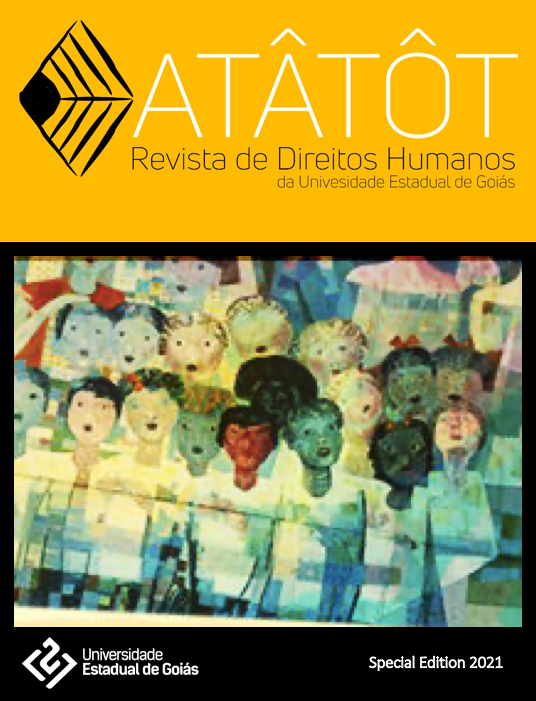Vol. 2 No. 1 (2021): Special Edition: June 2021

Atâtôt, the Interdisciplinary Journal of Human Rights of UEG, is a biannual academic publication under the responsibility of the State University of Goiás. Its goal is to create interdisciplinary spaces for the publication of articles, essays, reviews, and other academic texts on the general theme of human rights, focusing on topics related to democracy, constitutional issues, and social struggles for rights.
In its special edition of June 2021, Atâtôt: Interdisciplinary Journal of Human Rights from UEG presents discussions initially developed at the international seminar "X Thinking Human Rights," held by the Interdisciplinary Center for Studies and Research in Human Rights of the Interdisciplinary Graduate Program in Human Rights at the Federal University of Goiás in November 2019.
In this sense, Atâtôt, the Interdisciplinary Journal of Human Rights from UEG, provides, in its special edition of June 2021, discussions on human rights from a critical perspective, bringing insights on the importance of resistance to neofascist threats and Bolsonaro's authoritarianism, the essential relationship between memory and human rights, the right to food in Argentina, the effective protection of human rights defenders, effective strategies to ensure human rights in times of neofascism, and the current quality of Brazilian democracy.
The first article, “Memory and its Relations with Cronos and Kariós”, by Prof. Dr. Solon Eduardo Annes Viola (UNISINO, Brazil) and Prof. Dr. Paulo Peixoto de Albuquerque (UFRGS, Brazil), analyzes the living and constant relationship between memory and the experience of the present, taking care to bring memory, truth and justice closer to contemporary human rights assumptions.
The second article, “The Right to Food in Tension with Collective Food Actions: The Case of Córdoba (Argentina) at the Beginning of the 21th Century”, by Prof. Dr. Martín Eynard (Universidad Nacional de Córdoba, Argentina), analyzes the characteristics of collective food actions in the city of Córdoba (Argentina) between 2001 and 2007, in order to stress these conflicts with the right to food, considering Latin American contexts from a sociological perspective.
The third article, “Human Rights Defenders and Networks for their Protection: A Response to Repressive Environments”, by Protection International's Head of Policy, Research and Training, Mauricio Angels (PI, Brussels), examines human rights protection systems to argue that the centrality of the State and individual protective measures are not sufficient to guarantee the physical and psychological integrity of human rights defenders. This is because Protection International's practical experience has shown that human rights defenders should be assumed as beings immersed in the struggles of their communities, in their relationship with other social and political actors, and in their interaction with territories, in the resistance to repressive and violent environments.
The fourth article, “Strategies to Guaranteeing Human Rights in Times of Fascist Threats”, by Prof. Dr. Pablo Romo Cedano (UNAM, Mexico), examines some of the most effective strategies to ensure the respect and promotion of human rights in the face of neo-fascism and democratic authoritarianism that present themselves, for example, in the Brazilian case.
Finally, the fifth article, “Democracy in Brazil and its Implications for Human Rights”, by Prof. Dr. Carlos Ugo Santander (PPGIDH/UFG, Brazil) and PhD students Carolina Hissa (PPGIDH/UFG, Brazil), Vanessa Coelho Guimarães (PPGIDH/UFG, Brazil) and Aletheia Woyames (PPGIDH/UFG, Brazil), explores, from the quality of democracy’s methodological theoretical framework perspective, the recent evolution regarding human rights, disputes, challenges and prospects from the political context of the government of President Jair Bolsonaro in Brazil.









